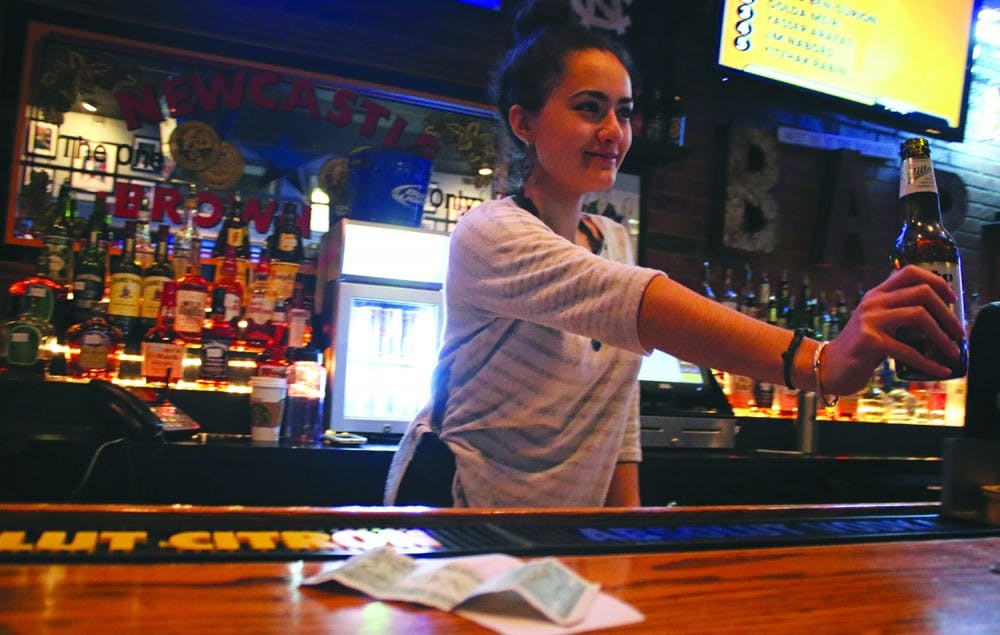But no restaurants in Chapel Hill or Carrboro have had complaints in 2015 about failing to supplement income.
Restaurants don’t have to ensure that tipped employees make $7.25 every hour they work — their hourly wage just has to average out to at least $7.25 for the entire pay period, allowing restaurants to pay them less in the long run.
Corinne Tabor, a former student who worked at Old Chicago during her time at UNC, said on average, she hardly reached $7.25 — even on the best days.
Old Chicago would calculate her average tips over a two-week period before supplementing her income, allowing the weekends to outweigh the slow days, and ultimately resulting in less income.
“Serving for tips is hard in a college town,” Tabor said. “None of your customers have money.”
Restaurants also sometimes “pool” their servers or bartenders’ tips, or combine a portion of each server’s tips and divide them evenly among those who worked. In North Carolina, employees must retain at least 85 percent of all tips they receive.
State labor laws also allow restaurants to deduct employees’ wages for inventory shortages. If a customer dines and dashes, or even forgets to pay for a drink at the bar, it usually comes out of the server’s paycheck.
Vasquez said living off tips and covering the costs of unpaid bills makes budgeting difficult. Her income varies based on the weather, the season or even how well the basketball team is doing.
Lake Rosenberg, a server and bartender at Top of the Hill, said his income is so varied because of tips that he didn’t actually know what he made per hour — just that it was very low.
“I don’t think that people know that,” he said. “I do appreciate the idea of somebody rewarding somebody else for a job well done, but it’s always nice to have a steady income and know how much money you’ll make.”
To get the day's news and headlines in your inbox each morning, sign up for our email newsletters.
NC ranks 35th
Since 2007, the minimum wage for most employees in North Carolina has steadily increased. Meanwhile, the minimum wage for tipped employees was reduced by a dollar even though tipping conventions remain the same.
In seven states, including California, Minnesota and Washington, restaurants must pay tipped employees the full minimum wage, meaning tips are an extra source of income.
In 26 states, the minimum cash wage for tipped workers is higher than North Carolina’s minimum wage.
In terms of the median hourly wage of waiters and waitresses, North Carolina ranks 35th among U.S. states. Servers in North Carolina can expect to make $8.72 an hour with tips, compared to the national average of $10.40, according to the most recent U.S. Bureau of Labor Statistics data from May 2014.
According to a 2015 report from Restaurant Opportunities Center United, a group that advocates eliminating the tipped minimum wage, about 21 percent of tipped restaurant workers nationwide live below the poverty line.
The report claims that the full-service restaurant industry is subsidized by the public in two ways: taxpayers fund public assistance programs for impoverished workers, and customers pay workers’ wages directly through tips.
No tips, please
Evidence shows that tipped workers, 66 percent of whom are women, are much more likely to experience sexual harassment as a result of feeling dependent on tips.
According to a joint report by the Restaurant Opportunities Centers United and Forward Together, the restaurant industry is responsible for more than a third of all sexual harassment claims. The report found that more sexual harassment claims were found in states with the lowest possible tipped wage of $2.13.
Vasquez said when she works as a bartender, older men will sometimes make inappropriate comments to her or their waitress.
“They’re in a position of power because they know I need tips,” Vasquez said. “As ideal as it would be to report every single comment, that’s not realistic.”
Issues with tipping conventions, minimum wage laws and fairness have prompted many restaurants to do away with tipping entirely.
Seafood chain Joe’s Crab Shack is one of the few American restaurants that have begun experimenting with tip-free dining.
“It’s simple, really,” said former CEO Ray Blanchette in a press release. “We believe that consistently great service should always be included in the menu price, so we are taking the responsibility for paying the service staff.”
The restaurant chain is increasing menu prices to be able to pay staff the full minimum wage. But the price hikes will be less than the typical 20-percent tip.
All the Chapel Hill servers and bartenders interviewed, four in total, for this article said they would prefer a system without tipping or at least an increase in the tipped minimum wage.
“I’d rather there not be tipping,” Rosenberg said. “Unfortunately, I don’t make enough money to make that decision.”
@laurennlai
special.projects@dailytarheel.com



